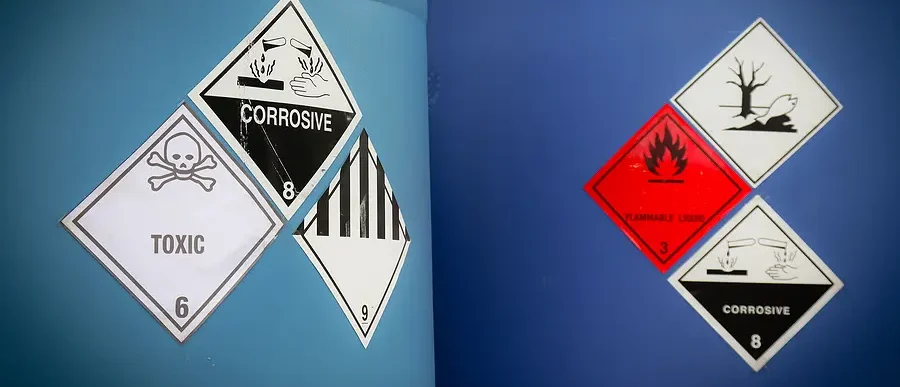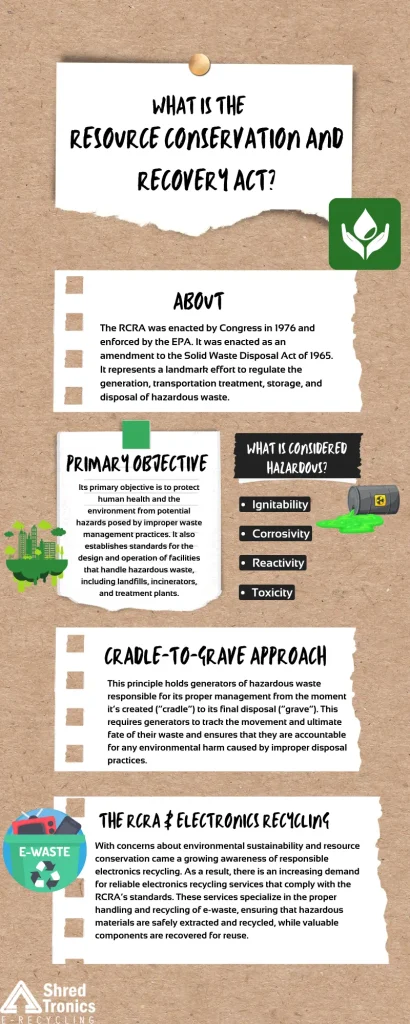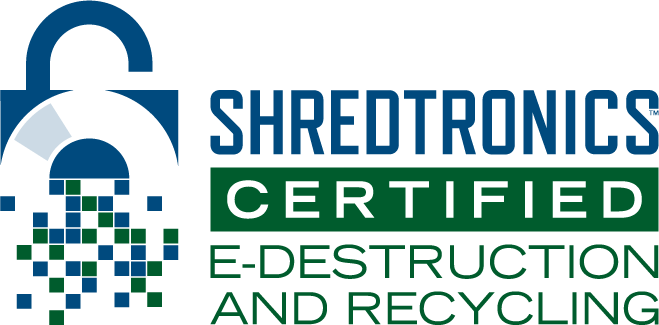
The responsible management of electronic waste has become an increasingly pressing concern. The best way to protect the environment and our communities is to have laws that control the release of hazardous waste. Enter the Resource Conservation and Recovery Act (RCRA). It is a crucial piece of legislation in the United States that addresses the challenges posed by hazardous waste, including e-waste. In this article, we’ll delve into what the RCRA entails and how it shapes the landscape of electronics recycling.
What is the RCRA?
Enacted by Congress in 1976 and enforced by the EPA, the RCRA represents a landmark effort to regulate the generation, transportation, treatment, storage, and disposal of hazardous waste. It was enacted as an amendment to the Solid Waste Disposal Act of 1965, which was the first federal statute to address solid waste.
Its primary objective is to protect human health and the environment from the potential hazards posed by improper waste management practices. The RCRA also establishes standards for the design and operation of facilities that handle hazardous waste, such as landfills, incinerators, and treatment plants.
The RCRA empowers the EPA to enforce regulations related to hazardous waste management, including e-waste. The EPA conducts inspections, issues permits, and imposes penalties on entities that violate RCRA regulations. By ensuring compliance with RCRA requirements, the EPA helps prevent environmental pollution and protect public health from the potential hazards associated with improper e-waste management.
In addition to regulating hazardous waste, the RCRA also addresses non-hazardous solid waste, such as municipal garbage and industrial waste. It encourages the development of recycling programs and waste reduction initiatives to minimize the amount of waste sent to landfills and incinerators.

What Does the RCRA Consider Hazardous?
The RCRA defines hazardous waste based on specific criteria outlined in the legislation. The RCRA considers a waste hazardous if it meets one or more of the following characteristics:
- Ignitability: Waste that can catch fire easily under certain conditions. For example, liquids with a flash point below 140 degrees Fahrenheit (60 degrees Celsius), or solids that spontaneously ignite.
- Corrosivity: Waste that is highly acidic or alkaline and can corrode containers, tanks, or equipment. Corrosive wastes have a pH less than or equal to 2 or greater than or equal to 12.5.
- Reactivity: Waste that is unstable, explosive, or reacts violently with water, air, or other substances. Examples include explosives, cyanides, and materials that generate toxic gases when exposed to water.
- Toxicity: Waste that contains substances listed as hazardous by the EPA due to their harmful effects on human health or the environment. The RCRA identifies specific toxic substances and sets concentration limits for them to determine whether a waste is hazardous.
In addition to meeting one or more of these characteristics, waste can also be classified as hazardous if it is specifically listed as such in regulations declared by the EPA. These lists include the F-list (wastes from common manufacturing and industrial processes), K-list (wastes from specific industries), and P-list and U-list (discarded commercial chemical products). It’s important to note that the RCRA applies to both solid and liquid waste, as well as sludges, gases, and other forms of waste.
The Cradle-to-Grave Approach
One of the key principles of the RCRA is the “cradle-to-grave” approach. This holds generators of hazardous waste responsible for its proper management from the moment it is created (“cradle”) to its final disposal (“grave”). This approach requires generators to track the movement and ultimate fate of their waste. Additionally, it ensures that they are accountable for any environmental harm they cause by improper disposal practices.
Moreover, the RCRA encourages the development of recycling infrastructure and the implementation of environmentally sound recycling techniques. Recycling not only helps conserve valuable resources but also reduces the need for raw materials extraction and minimizes the environmental impact associated with manufacturing new products.
The RCRA and Electronics Recycling
In recent years, there has been a growing awareness of the importance of responsible electronics recycling. It’s been driven by concerns about environmental sustainability and resource conservation. As a result, there is an increasing demand for reliable electronics recycling services that comply with regulatory requirements and adhere to best practices in waste management.
If you’re looking to dispose of old electronic devices responsibly, partnering with a reputable electronics recycling service is essential. These services specialize in the proper handling and recycling of e-waste. They ensure that hazardous materials are safely extracted and recycled, while valuable components are recovered for reuse.
Comply with the RCRA with ShredTronics Today
At ShredTronics, we understand the importance of sustainable electronics recycling. We provide reliable and environmentally friendly solutions for your e-waste disposal needs. Our state-of-the-art recycling facilities are equipped to handle a wide range of electronic devices. We ensure to responsibly recycle your electronics while minimizing their environmental footprint. Contact us today at (844) 648-4908 or fill out the form to learn more about our electronics recycling services.
You will have peace of mind knowing that we recycle your old electronics following the highest environmental standards. Additionally, you’ll be helping to conserve resources, reduce pollution, and protect our planet for future generations.








